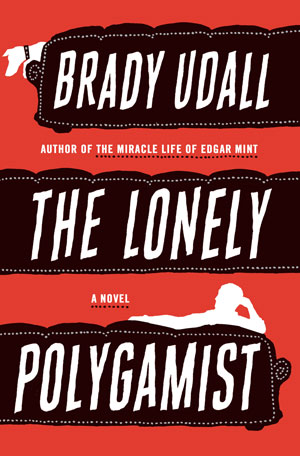
by by Margaret Kolb

Published by W. W. Norton & Company, 2010 | 602 pages
Brady Udall’s second novel, The Lonely Polygamist, is the story of the downfall and disintegration of a polygamist family in Virgin, Utah. Think epic American novel meets Big Love and you’ll have a sense of this investigation into the mental and emotional turbulence - and inter-familial dynamics - of (nearly) contemporary Mormon life. Polygamist, like Udall's other works, takes place in a West hazardous with uranium drilling, nuclear testing, government-run scientific experiments on the public, homemade explosives and brothels. Spanning the course of three weeks during the 1970s, Polygamist charts each character's course as each spirals down rabbit holes of disappointment, rejection and / or adultery.
Golden Richards, owner of a construction company and patriarch of four wives and 28 children, is a gargantuan unkempt man who is referred to by one of his children as “Sasquatch.” Although Mormonism officially disavowed polygamy in 1890, Golden and his small community struggle to live a secretive polygamist life they believe was commanded by God. All of the members of Golden’s family are worn down by the secretive, cramped polygamist life-style; all feel under-appreciated, including him. On top of this, though his four wives (Beverly, Rose, Trish and Nola) think he’s employed building a retirement facility, he’s contracted to build an addition to the PussyCat Manor, a famous brothel just over the Utah border in Nevada. Over the course of the novel’s three weeks, and amidst these circumstances, the family comes loose like the second hand threads they’re resigned to wear.
If Faulkner’s Absalom, Absalom! is a great novel because of the profundity of its portrayal of race and class at the turn of the century in the American South, Polygamist should be considered its West Coast counterpart. Like Faulkner’s Thomas Sutpen, Udall uses Golden Richards as the male patriarch filter through which all the drama passes. Both characters try to maintain a somewhat prudish and old fashioned lifestyle. Assumed roles of gender and race in Faulkner’s genteel south become an implied code of ethics known as “The Way” in Udall’s polygamist community. The racism and incest that both bonds and destroys the Sutpen family is the infidelity and imprisonment of a polygamist lifestyle that binds and destroys the Richards family. In both novels, the characters struggle to both belong to and escape from their inherited communities, yet none are ever quite able to do either.
The book’s structure switches between points of view, allowing a sense of intimacy to emerge between character and reader and gives us flashbacks to Golden’s youth when he converts to Mormonism after reuniting with his runaway father. Not only do we get Golden’s past, but also anecdotes from the past of each wife, including Huila, the soft-spoken wife of Ted Leo, owner of the Pussycat manor. Golden and Huila embark on a chaste affair, but as Udall tells it, it's hard to blame them, or anyone else here, for their shortcomings and infidelities. Each character struggles to find a small piece of happiness somewhere inside the tangled web of family, religion and circumstance.
At worst, The Lonely Polygamist is just another story about a man who’s still a boy and can’t quite find himself. Stuck in the sludge of his past, he uses unhealthy coping mechanism to deal with uncertainty and stress that all of our lives contain. At its best, Udall’s novel masterfully interweaves the complexities of four nuclear families where the risks of relationship, and the endless bounty of love, are exposed in the most unusual circumstances. Ultimately the novel explores whether or not there are limits on how much love one person can be expected to give, even to his family. Although redemption isn’t an obvious presence within this work, the surprising turns, small heartbreaks and comedic anecdotes that suffuse The Lonely Polygamist suggest that hope may be at play in art and life after all.
Patrick Haas is an MFA student at the Iowa Writers’ Workshop.















click to see who
MAKE Magazine Publisher MAKE Literary Productions Managing Editor Chamandeep Bains Assistant Managing Editor and Web Editor Kenneth Guay Fiction Editor Kamilah Foreman Nonfiction Editor Jessica Anne Poetry Editor Joel Craig Intercambio Poetry Editor Daniel Borzutzky Intercambio Prose Editor Brenda Lozano Latin American Art Portfolio Editor Alejandro Almanza Pereda Reviews Editor Mark Molloy Portfolio Art Editor Sarah Kramer Creative Director Joshua Hauth, Hauthwares Webmaster Johnathan Crawford Proofreader/Copy Editor Sarah Kramer Associate Fiction Editors LC Fiore, Jim Kourlas, Kerstin Schaars Contributing Editors Kyle Beachy, Steffi Drewes, Katie Geha, Kathleen Rooney Social Media Coordinator Jennifer De Poorter
MAKE Literary Productions, NFP Co-directors, Sarah Dodson and Joel Craig